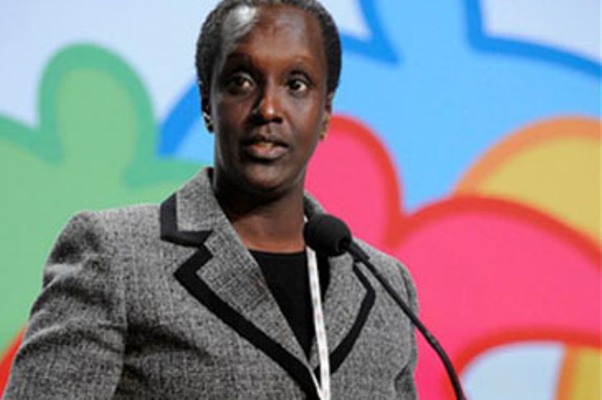By Mark Baber
February 4 – Australia’s Moya Dodd will challenge Lydia Nsekera (pictured) for the newly created position of women’s representative on FIFA’s Executive Committee.
Nsekera was co-opted on to the FIFA Executive Committee last year at the 2012 FIFA Congress and is the first woman to sit on the committee. The formal election of a woman representative on the Executive Committee will be held at the FIFA Congress in Mauritius, May 31.
Dodd has been nominated by the Asian Football Confederation (AFC).
A lawyer, based in Sydney, Dodd specialises in telecommunications, online businesses and converging media.
She joined the board of the Football Federation Australia in 2007 and she was elected Vice President of the Asian Football Confederation in 2009 and also acts as Chair of the AFC Women’s and Legal Committees.
She worked closely with ExCo member, Prince Ali of Jordan to end the ban on the hijab for women players in FIFA tournaments. She is up for re-election in her AFC roles on May 2 in Kuala Lumpur.
Her concerns include opening up more opportunities for women to take up professional careers in football, bringing women’s football to parts of the world where cultural barriers make access difficult (such as Saudi Arabia) and is a believer in building grassroots football through the clubs which she describes as the “heartland of football”, and advocates for federations seek to create similar opportunities for girls as for boys.
Dodd will find it hard to unseat Nsekera who is the president of the Burundi FA (the only female FA president in the world), and has been a member of the International Olympic Committee since 2009.
Nsekera is credited with having turned Burundian football around after taking over as president of the FFB in 2004 with football in total disarray in the country, no league being played and FIFA having frozen grants due to misuse of funds.
Nsekera was gifted at high jump and basketball but never played football – “At the time, girls did not play.”
However, her father chaired a football club in the 1970s, and she shared his passion, creating women’s teams in Bujumbura in 1990, launching the first national championship for women, and also ensuring that women can be referees for men’s games.
Nsekera has been a member of the IOC since 2010, and member of the Commissions on Women and Sport and Sport and Television. At FIFA, Nsekera has been on the Independent Governance, Women’s Football, Women’s World Cup and Olympic Football Tournaments Committees.
Nsekera is a winner of the IOC’s Women and Sports Award (2009) and has described the obstacles she has overcome, “Women have to understand that they have a role to play off the pitch, that they can easily take on responsibilities and become leaders. Men need to accept that too…In Africa, no one thinks that women are cut out to be leaders, especially in football. So it’s been a long process for me to find acceptance.”
All member federations of FIFA will have a vote on the women’s representative and Dodd is expected to pick up the votes from the AFC (46) and Oceania (11). Nsekera is expected to pick up the votes of CAF (54) and UEFA (53). In Dodd’s favour is the fact she played for her country’s women’s team, an opportunity which was not available for Nsekera.
Contact the writer of this story at moc.l1745645108labto1745645108ofdlr1745645108owedi1745645108sni@o1745645108fni1745645108

